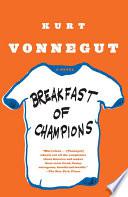Breakfast of Champions (1973)
Context: I thought Beatrice Keedsler had joined hands with other old-fashioned storytellers to make people believe that life had leading characters, minor characters, significant details, insignificant details, that it had lessons to be learned, tests to be passed, and a beginning, a middle, and an end.
As I approached my fiftieth birthday, I had become more and more enraged and mystified by the idiot decisions made by my countrymen. And then I had come suddenly to pity them, for I understood how innocent and natural it was for them to behave so abominably, and with such abominable results: They were doing their best to live like people invented in story books. This was the reason Americans shot each other so often: It was a convenient literary device for ending short stories and books.
Why were so many Americans treated by their government as though their lives were as disposable as paper facial tissues? Because that was the way authors customarily treated bit-part players in their madeup tales.
And so on.
Once I understood what was making America such a dangerous, unhappy nation of people who had nothing to do with real life, I resolved to shun storytelling. I would write about life. Every person would be exactly as important as any other. All facts would also be given equal weightiness. Nothing would be left out. Let others bring order to chaos. I would bring chaos to order, instead, which I think I have done.
If all writers would do that, then perhaps citizens not in the literary trades will understand that there is no order in the world around us, that we must adapt ourselves to the requirements of chaos instead.
It is hard to adapt to chaos, but it can be done. I am living proof of that: It can be done.

